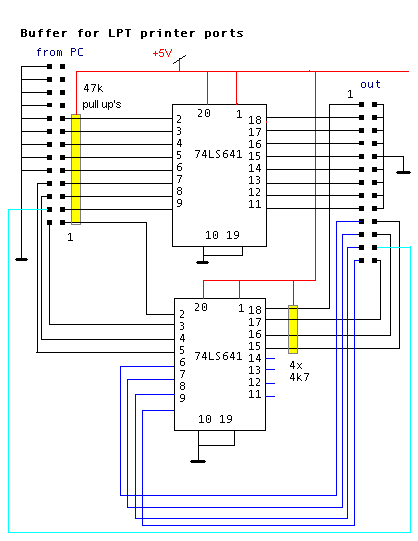
Note with regard to the use of printer ports on Pentium computers:
Early PC's used standard TTL chips for driving their printer ports. Chips such as 74LS374 (data latch) and 74LS245 were most often used. With the advent of SMD technology and high scale integration of components on the planar, these chips have become obsolete. This newer technology however has some serious disadvantages for users like ourselves that use these printerports for quite non-standard purposes, such as hardware automat controll as found in automated muscal instruments and robots. Here the printer ports are used to drive at times quite long flatcables. This may cause the modern chips to fail because of overheating... More than once we found ourselves confronted with burnt out LPT ports on Intel motherboards caused by these hefty loads.
A remedy against this all consists of buffering the printer port using a couple of cheap 74LS641 open collector bus transceivers. The very simple circuit looks like drawn below.

The lines drawn in blue color are optional, if you want to buffer also the lines running from your hardware into the PC. You should also connect pins 14,13,12,11 from the second 74LS641 to the respective pins on the input header or DB25 connector. These lines all use the base portadress + 1. The datalines use the basesadress and the controll lines, the base adress + 2. The required +5V power may be derived from either the PC or from the connected hardware. A separate small switcher (230V AC in, 5V DC out at 1A) may be used as well.
The 74LS641 chips are opencollector devices. We did not fit pull up resistors on the output data lines, for these should be mounted on the connected hardware. Only the controll lines have pull-ups (4k7 resistors) just like on legacy ISA-bus printer port cards.
The circuit is completely transparant to your software.
Back to Godfried-Willem Raes index-page
Back to Logos main index page
Back to Web Strikes Back index page
Published on the web August 9th 0 by Godfried-Willem Raes
Last update: 2001-04-25